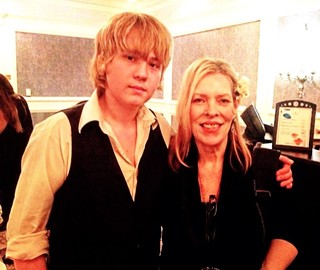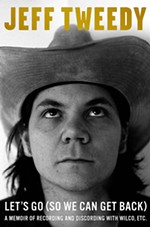Margaret Moser Exit Interview
No Cassandra complex for Austin’s senior music journalist
By William Harries Graham, 2:07PM, Thu. May 22, 2014
Last Thursday, after the city dedicated Margaret Moser Plaza to her, its namesake remarked, “I got in through the back door, so whenever I get invited in through the front door, I always run to the back door to see who I can let in.” That’s me, the youngest musician she ever invited to play the Austin Music Awards in 2007.
My “Auntie M” in that I’ve known her all my life, Margaret Moser remains an icon of the original guard representing Austin music. What makes the 60-year-old cancer combatant essential to the city’s beloved natural resource is her genuine fascination with musicians. While she wrote poetry early on, Moser says that even as a teenager, “I had a gut feeling I belonged somewhere in the music business.”
Inspired by Creem and Rolling Stone, her path was clear. She credits those magazines with establishing the “heretofore nonexistent position of rock critic.” Moser retired from the Chronicle last Friday, so in her final days as my journalism mentor, she acquiesced to an interview about her career.
Austin Chronicle: MUSIC – what happened?
Margaret Moser: It’s been a little over 100 years since music became available in recorded and broadcast form, so the whole notion of “live music” is still new, in relative terms, because there was only live music before that. What I hope for is continued ways of preserving and documenting it.
AC: What did you look for in writers that you recruited for the Chronicle?
M: People who mirrored my deep and abiding love for music and expressed it in ways that meant something to me.
AC: What have you loved about your work?
M: It’s been gratifying in a way that’s hard to explain. Sometimes the satisfaction came from knowing I’d gotten a good story, and sometimes there was just the thrill of meeting a musical hero. Interviewing the likes of Patsy Montana, Paddy Moloney, and Pinetop Perkins have been career highlights.
AC: Overall, how would sum up your career?
M: Incredibly lucky. How many women are paid to write about music full-time? Especially women my age.
AC: When did you know that music journalism was for you?
M: The moment I stepped into the Austin Sun offices in May 1976! I was brought in to clean the offices and answer phones, but I bugged music editor Bill Bentley constantly, submitting items for the gossip column that were always rejected. Bentley regarded me as a pain in the ass, which I doubtless was.
AC: Biggest filter?
M: A finely tuned bullshit detector and the ability to tell if ambition is superseding talent.
AC: Music writing – evaluation or interpretation?
M: Interpretation first, because to me, that’s an essential component of evaluating it. I prefer reviews that provide opinions by which the listener can evaluate the music to reviews that simply tell you what the reviewer thinks.
AC: When you’ve heard new bands that went on to be bigger, how did you know they had the magic?
M: It’s just one of those gut things. Sometimes it built up from things like watching Stevie Vaughan woodshed. I became an instant fan, like the first time I heard Lucinda Williams sing “Pineola.” The first time I saw Sarah Jarosz, I was struck with her poise as much as her songs and playing.
AC: What’s surprised you most about Austin music culture?
M: That it achieved so much of its potential with very little traditional infrastructure and unbelievable amount of blind faith and talent.
AC: Most interesting interview?
M: I wrote a total of about 11,000 words on the 13th Floor Elevators – parts one and two! – and it was as illuminating as it was trippy to descend into that world.
AC: Strangest experience as a writer?
M: Having the Velvet Underground’s lawyer call the office after questions I asked VU drummer Maureen Tucker made her nervous. I had personal information about VU bassist Sterling Morrison that was common knowledge around Austin but unknown to some of his old East Coast bandmates. The lawyer leaned on me hard not to print it. I did, because it was true, but it was pretty bland and not terribly revealing.
AC: Biggest journalist lesson?
M: To listen to what the interviewee is really talking about.
AC: As a woman?
M: That yes, I am sometimes treated differently because of my gender, but mostly that if I’m prepared and conduct myself professionally, I will get what I want and need.
AC: As a human being?
M: That the hardest thing I’ve done is interview parents who have lost a child. It’s almost unbearable.
AC: We can’t leave the interview without mention of the Texas Blondes?
M: Being a groupie was an entirely different experience then than now. For me, there was an innocence about the whole thing, especially in the early Seventies, because it reflected the hippie ethos of “free love.” The Texas Blondes were more of civic group, in that we were organized and informed, and were as prepared to do laundry or lead a tour of the Capitol.
AC: Did being a Texas Blonde make you a better music writer?
M: Definitely! The musicians were usually completely themselves and candid in the groupie situations. After a while I began to understand the commonality of their lives, how touring always takes its toll on a musician’s family, and that women on tours deal with things differently than men on tour, etc.
AC: One secret?
M: My father wanted to name me Cassandra. Since myth has it she was doomed to tell the truth but not be believed, that would have been a helluva name to have when I was gossip columnist. I also take great pride in being a Texan.
A note to readers: Bold and uncensored, The Austin Chronicle has been Austin’s independent news source for over 40 years, expressing the community’s political and environmental concerns and supporting its active cultural scene. Now more than ever, we need your support to continue supplying Austin with independent, free press. If real news is important to you, please consider making a donation of $5, $10 or whatever you can afford, to help keep our journalism on stands.
Raoul Hernandez, Sept. 1, 2017
Dec. 21, 2018
Dec. 22, 2017
Margaret Moser, 13th Floor Elevators, Velvet Underground, Sterling Morrison, Bill Bentley, Stevie Ray Vaughan, Lucinda Williams, Sarah Jarosz, Patsy Montana, Paddy Maloney, Pinetop Perkins











